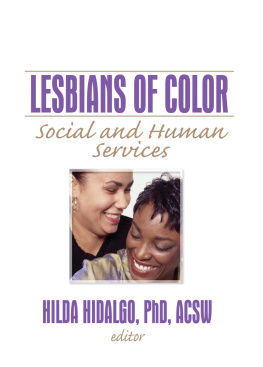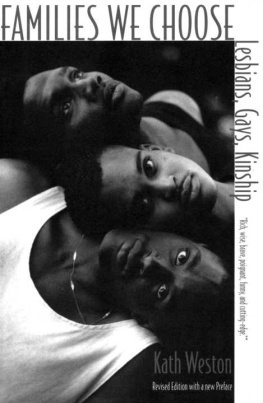Lesbians of Color: Social and Human Services
Lesbians of Color: Social and Human Services
Hilda Hidalgo, PhD, ACSW Editor
Lesbians of Color: Social and Human Services has also been published as Journal of Gay & Lesbian Social Services, Volume 3, Number 2 1995.
1995 by The Haworth Press, Inc. All rights reserved. No part of this work may be reproduced or utilized in any form or by any means, electronic or mechanical, including photocopying, microfilm and recording, or by any information storage and retrieval system, without permission in writing from the publisher.
The development, preparation, and publication of this work has been undertaken with great care. However, the publisher, employees, editors, and agents of The Haworth Press and all imprints of The Haworth Press, Inc., including The Haworth Medical Press and Pharmaceutical Products Press, are not responsible for any errors contained herein or for consequences that may ensue from use of materials or information contained in this work. Opinions expressed by the author(s) are not necessarily those of The Haworth Press, Inc.
First published by
The Haworth Press, Inc., 10 Alice Street, Binghamton, NY 13904-1580 USA
This edition published 2013 by Routledge
Routledge
Taylor & Francis Group
711 Third Avenue
New York, NY 10017
Routledge
Taylor & Francis Group
2 Park Square, Milton Park
Abingdon, Oxon OX14 4RN
Routledge is an imprint of the Taylor & Francis Group, an informa business
Library of Congress Cataloging-in-Publication Data
Lesbians of color: social and human services / Hilda Hidalgo, editor.
p. cm.
Includes bibliographical references and index.
ISBN 1-56024-751-7 (thp: alk. paper). ISBN 1-56023-072-X (hpp: alk. paper)
1. Social work with lesbians--United States. 2. Social work with minorities--United States. 3. Lesbians--Services for--United States. 4. Minorities--Services for--United States. I. Hidalgo, Hilda.
HV1449.L494 1995
362.8308693dc20 | 95-36538
CIP |
Dedication
To Joan L. McEniry, because for thirty-five years you have been my loving life companion, and our relationship has helped me to be a better person.
H. H. (1995)
Lesbians of Color: Social and Human Services
CONTENTS
L. Diane Bernard
Natalie Jane Woodman
Hilda Hidalgo
Mary E. Swigonski
Hilda Hidalgo
Mi Ok Bruining
Mi Ok Bruining
Mary E. Swigonski
Mariana Romo-Carmona
Cheryl Clarke
ABOUT THE EDITOR
Hilda Hidalgo, PhD, is Professor Emerita at Rutgers University and serves on the editorial board of the Journal of Gay & Lesbian Psychotherapy. She is a member of the Advisory Committee of the New Jersey Department of Human Services, the National Association of Social Workers, and the Association of College and University Professors. She founded and was first president of Aspira, Inc., of New Jersey and of the State of New Jersey Puerto Rican Congress. Dr. Hidalgo has published several articles and addressed numerous conferences on topics including Hispanics in higher education, Puerto Ricans in New Jersey, and gay and lesbian issues. She is a certified marriage counselor, certified teacher, and certified with the Academy of Certified Social Workers and the Academy of Certified Clinical Social Workers.
To encounter Hilda Hidalgo is like being exposed to fine crystalher voice rings with utter clarity
The analogy, while true, is limited by association with fragility when, in fact, her power is strong and forceful
Passionate and compassionate by turn: both courageous and outrageous
She is and has been a true lesbian warrior.
Long before it was chic or politically correct she was not only out, but outspoken
In exposing the corrosive effect of homophobia
For more than a quarter of a century she has taken personal and professional risks to combat all forms of oppression and injustice toward women
Her voice has been consistently heard in behalf of lesbians of color suffering multiple discriminations.
It is a tribute to her outstanding leadership and consistent contributions that she was invited to edit this special collection
There could be no better choice.
L. Diane Bernard, PhD
L. Diane Bernard, PhD, is currently enjoying her recently claimed retirement, and continues to serve as a consultant to schools of social work. She has served as Acting Director of the Council in Social Work Education, Dean of the School of Social Work of Florida State University, and Director of the Doctoral Program at Virginia Commonwealth University, Richmond.
Her address is 5623 Gulf Drive, Panama City Beach, FL 32408.
Haworth co-indexing entry note]: Forewad. Bernard, L. Diane. Co-published simultaneously in Journal of Gay & Lesbian Social Services (The Haworth Press, Inc.) Vol. 3, No. 2, 1995, p. xv; and: Lesbians of Color: Social and Human Services (ed: Hilda Hidalgo) The Haworth Press, Inc., 1995, p. xiii; and: Lesbians of Color: Social and Human Services (ed: Hilda Hidalgo) Harrington Park Press, an imprint of The Haworth Press, Inc., 1995, p. xiii. Multiple copies of this article/chapter may be purchased from The Haworth Document Delivery Center [1-800-3-HAWORTH; 9:00 am. - 5:00 p.m. (EST)].
It has been with feelings of great honor and privilege that I have read this significant collection of articles by lesbian women of color. In searches of recent Annotated Bibliographies (Epstein & Zak, 1992; Lee, 1991), one becomes only too aware of the paucity of social work writing related specifically to women who are lesbian and who are from diverse ethnic groups. As a social work pioneer publishing in this area, it is fitting that Hilda Hidalgo should be the editor of this special collection, contributing her own wisdom and drawing together a unique group of lesbian writers to provide decibels of sound for a community whose voice had been so feeble in our social work literature. Each author provides knowledge, practical (as in social work practice) and attitudinal insights to enhance our interactions with lesbians of color.
The Multicultural Lesbian Publication is not limited in focus but, for the first time, speaks to special issues of lesbians of color: adoption, class differences, physical challenge, and mental health issues. The personalized accounts from various authors graphically depict the deep-seated impacts of racism, sexism, and homophobia in our society. When coupled with the scholarship derived from different ways of knowing, this body of work guides us to operationalize the professions Code of Ethics so well that we all may become models for social change and social justice. It also guides us in our respect for difference and our mandate to end oppression.
Notable themes throughout the articles include: feminism as a pervasive model for empowerment; empowerment as a tool for healing; healing as an alternative for victimization; using the power of words for exorcising the demons of racism, homophobia, and all the other isms; social change as the overriding goal of social work if we are to move from oppression to self-actualization for all; and, perhaps most crucially, the application of Standpoint Theory to practice and to our very lives. Internalizing new Standpoints permits the reader to move from intellectual to empathic grasp of the point made by each author. Another very significant contribution by the authors is the inclusion of a breadth of references related to lesbians of color. The readings proposed are not only scholarly but emotionally touching and/or just plain fun.






